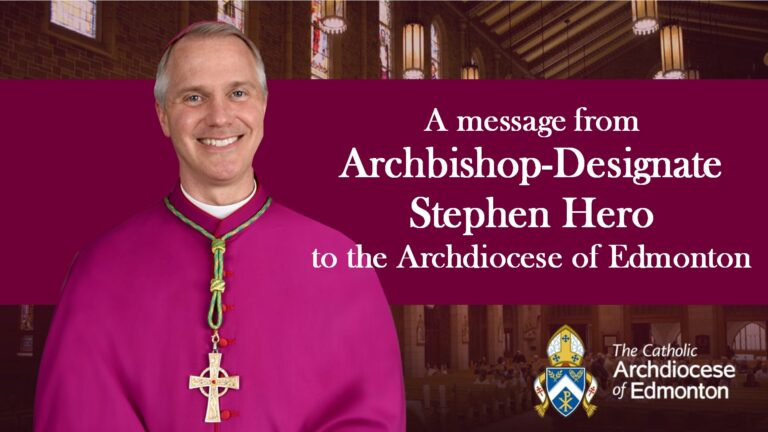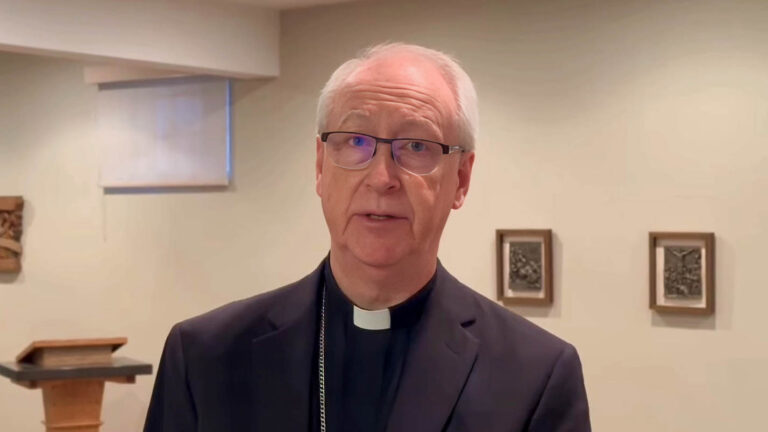Feast of Our Lady of Guadalupe 2023
Homily
[Zechariah 2:10-13; Revelation 11:19a, 12:1, 3-6a, 10ab; Luke 1:39-47]
My thoughts for the homily this evening are shaped by two recent encounters I have had with parishioners of the Archdiocese. What has been shared with me by these faithful people can lead us into the message of Sacred Scripture and of this special feast itself.
In a meeting with parishioners in the course of a parish visit, we were discussing together some of the enormous social challenges that we confront daily. Topics touched upon included the opioid crisis, lack of affordable housing, and the economic insecurity faced by many families and individuals. As we spoke of the different forms of outreach and advocacy with which we can be involved as followers of Christ, one woman agreed with them all but then added that the unique and decisive contribution of the Church is prayer. We need, individually and collectively, to bring our problems before the Lord, who alone can fully resolve them.
Of course, she is absolutely right. The command of Jesus to love our neighbour needs to be made concrete in good works, certainly, but what must be in the forefront is prayer, by which we take to the feet of our Lord the many challenges faced by his people. The problems are vast and beyond our limited capacities fully to eradicate, but by prayer we bring our impossible situations to the One for whom nothing is impossible, as Mary was assured when she learned her elderly kinswoman Elizabeth was with child. The prayer of the Church rests on the confident assurance that God listens and responds. As we heard Zechariah prophesy, God not only hears but also draws near to His people, so great is His love.
In these days of Advent, we turn our hearts toward the celebration of that event in which God’s promise to come to his people was fulfilled. In tonight’s mass we direct our particular attention to the one through whom God came to dwell among us. I speak here, of course, of the Blessed Virgin Mary. This leads me to another meeting with a parishioner within the last few weeks.
Again, we were speaking of the hardships endured by so many people today, not only here at home but also throughout the world. We touched as well upon worrisome challenges faced by the Church. Considering it all, she said to me, “It is time to bring momma back into the house.” That is a rather striking way of putting things, but what it expresses is indisputably true: we must go to Mary. This call to turn to Our Lady gives the need for prayer a particular focus. The Church prays in many ways to Almighty God for the help and renewal He alone can bring about. In addition, the tradition also does not hesitate to call upon Mary and implore her to intercede with her son Jesus, because her prayer does not fail to be heard and answered.
“It is time to bring momma back into the house.” Of course, in terms of the Church, the home of God’s people, we do not need to “bring her back” because she has never left it. She is, after all, the Church’s pre-eminent member; indeed, she is the Church’s mother. Yet, are we welcoming her into the home of our hearts, or across the threshold of our family dwelling? If not, it is indeed time to invite her back into our lives and pray fervently to her. She wants to visit us in our need, just as she visited Elizabeth in hers.
This all puts me in mind of Mary’s encounter with San Juan Diego at Tepeyac. Knowing that Juan was worried about his sick uncle, she said, “Am I not here, who am your mother?” and then assured him his relative would be well. Those same words are now emblazoned on the façade of the great Basilica dedicated to the Blessed Mother at Guadalupe, thus indicating that she directs them to all her beloved children. Mary, the Mother of the Church, is with us. She wants each of us to rest in the assurance of her maternal love and rely upon her powerful prayer.
Yes, there are many challenges that face us in this present moment of history. On this National Day of Prayer in Solidarity with Indigenous Peoples, our hearts turn to the First Nations, Métis, and Inuit populations, beloved of Jesus, Mary, and the Church. Their legacy of pain and marginalization belongs now to our collective awareness as a country, and so we lift up our brothers and sisters in prayer to the mercy of God. Together with them, we ponder the manifold challenges facing individuals and families, the hopelessness gripping many young people, the polarization of our societies, the infidelities within the Church, and wars among nations. The resolution of all this lies far beyond the limits of human endeavour, but not outside the reach of God’s powerful love, nor the effective concern of Our Lady of Guadalupe. So, tonight let us make the Church’s decisive contribution by offering heartfelt and earnest prayers to our Lord and to our Blessed Mother, that they will do for us what we could never accomplish on our own.
The supreme form of the Church’s prayer is, of course, the celebration of the Eucharist. Here the Lord unites to his own self-gift the offering we wish to make to the Father of our own lives on behalf of all in need. Encouraged by the presence with us of the Blessed Mother and assisted by her own prayers for the world, may God grant that we be privileged witnesses in our day of the fullness of his healing power.
Most Reverend Richard W. Smith
Saint Joseph Basilica
December 12th, 2023



